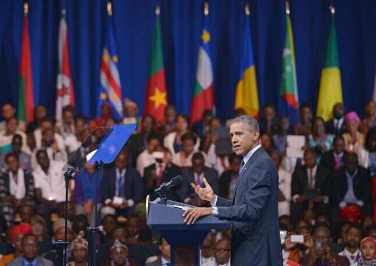Activists call on US to make Sudan conflicts top priority
August 6, 2014 (WASHINGTON) – Sudanese diaspora groups and activist organisations based in the US have called for a no-fly zone in conflict zones and the disabling of government aerial assets to end ongoing atrocities against civilians.

In a letter signed by 64 groups, the US administration and African leaders are urged to consider the welfare of Sudanese people in their discussions during the summit and to make ending the country’s conflicts a priority.
The Sudanese government has been accused to committing genocide, ethnic cleansing and mass atrocities against its citizens.
President Omer Hassan al-Bashir, who is wanted by the International Criminal Court (ICC) on charges of war crimes and crimes against humanity, was not invited to the summit.
Activist groups say that ongoing conflicts in Darfur, South Kordofan, Blue Nile, Abyei, Nubia, Khartoum and East Sudan have little prospect of resolution, calling for the US to step up its engagement with Sudan.
“We continue to hope that the US administration will live up to president Obama’s past promises and its obligations under the Convention on the Prevention and Punishment of the Crime of Genocide with a revised and effective foreign policy on Sudan,” activist groups said in the 5 August letter.
“We believe the US administration could play a vital role together with the African leaders,” it adds.
Civil liberties, including freedom of the press, freedom of religion, freedom of assembly, freedom of speech, and the rights of women, have been severely curtailed under Sudan’s ruling National Congress Party (NCP), say activist groups.
In 2011, the Sudanese government renewed its military campaigns in the Nuba Mountains, with ground attacks, frequent indiscriminate bombings and killings resulting in near starvation for hundreds of thousands of people, while one million were displaced internally or across the border.
Security in Darfur has also continued to deteriorate significantly, with 390,000 displaced in the first six months of 2014, according to UN estimates.
Diaspora and activist groups accuse the Sudanese government and its allied militias of carrying out “genocide by attrition” by blocking food, medical and humanitarian aid to internally displaced people in Darfur, the Nuba Mountains and Blue Nile state.
They are urging the US to exert diplomatic efforts to persuade the Sudanese government to allow unconditional humanitarian to vulnerable and displaced populations and secure the release of political prisoners and other detainees being held because of their ethnicity or religion.
The groups are also seeking the permanent disbanding and disarming of the Rapid Support Forces (also known as Janjaweed) militia forces and for those responsible for human rights abuses to be held accountable.
Activist groups also took their calls to the streets on Tuesday, rallying outside the Sudanese embassy before marching to Lafayette Park, across from the White House.
They are urging the US administration to engage with all relevant Sudanese stakeholders groups “to facilitate and support them in forging a true national dialogue and agreeing on peaceful means of change in effecting an inclusive, peaceful democratic transition in Sudan”.
“The Sudanese people are eager to contribute to the world’s security and prosperity, not just to be a place for crisis and poverty,” the letter states.
“The new leaders and generations are keen to establish and forge a real partnership with the United States and other peace-loving nations, especially in Africa, and to work together to build a better world – one in which genocide is never considered a legitimate policy option, and where Sudan is not a safe haven for terrorist organisations,” the letter adds.
The first ever US-African Leaders Summit is being attended by some 45 heads of state form the African continent.
(ST)
